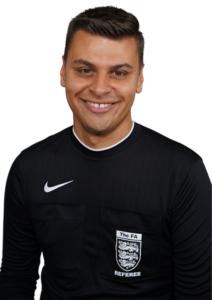Struggling to sleep? The answer to a good night’s sleep might not be to relax and do nothing, but to get out refereeing. As little as ten minute’s aerobic exercise a day can improve the quality and duration of your sleep.
But a quick dash to the shops and back won’t work wonders – unless you do it regularly. Refereeings sleep-tastic benefits are better and longer lasting when you routinely train. I often hear back from my clients that after a few weeks or months of regular training, that they not only start to feel better, they sleep better too.
The Scientific Part
Refereeing affects our sleep cycles in a few different ways. Firstly, the most obvious; by moving more and faster than we usually would, we tire ourselves out.
Sleep is also a great stress buster, helping us to unwind after a busy day by shifting our focus from our worries to our job of managing a game, and helping us to get into a meditative state through repetitive movements.
And that’s not all. Aerobic exercise stimulates our bodies to release serotonin, a neurotransmitter which helps improve our mood and most importantly, regulate our sleep.
It’s All About The Timing
It used to be said that exercising in the middle of the week, too close to bedtime ‘revved you up’ and could actually cause sleep problems, however, for some people this doesn’t hold true. It’s about finding out what works for you and your family, and more importantly, where and when you can make yourself available to officiate around your other commitments.
If you find that you’re too busy during the week, why not plan a fast walk, swim or gym visit after the family are all settled for the evening? Some people like to exercise before bed, finding it literally tires them out and gives them a good night’s sleep.
Some studies are beginning to show that exercising in the morning can help with your body’s circadian rhythms (our sleep/wake cycle), if you don’t fancy a pre-work training session, why not ditch the car and walk (or run!) to work or school?
Get A Sweat On, Get Sleeping
There’s no one form of exercise that is perfect for enhancing your sleep, any movement is better than none. However, there are three types of exercise that can help supercharge your sleep:
Aerobic Exercise – also called cardiovascular exercise because it’s the type of exercise that gets our hearts beating faster. You can break training up into small bouts throughout the week. Running, brisk walking, swimming, cycling or a fast-paced exercise class like Zumba are all perfect. For younger officials, walking fast to and from school, swimming, running around at playtime or going to an after-school sports club will help regulate their sleep and tire them out.
Strength Training – studies show that building muscle can help with improving your sleep, especially helping you to fall asleep faster and keep you asleep throughout the night. A full-body, half-hour strength workout works best, try crunches, bicep curls, leg presses, planks, squats, push-ups and calf raises. As an added bonus strength training will also help improve your performance on the field of play.
Yoga – although it won’t get your heart rate going, yoga’s slower movements and its focus on breathing will help to calm you down and can help shift your focus from your worries to your movements. Yoga is a gentle way to build your body’s strength and flexibility, two things we need to keep going as we get older.
Sleep More, Train Harder
It’s not just training that makes you sleep better, there’s a vice versa effect too. The better you sleep, the better your refereeing will be. Sleep is as an important element in your officiating as, well, your training.
As we sleep, growth hormones are released improving muscular regeneration and recovery, our energy consumption drops, so we can use the (good quality!) food we’ve eaten in the day to build and repair our muscles. Professional referees build in sleep and rest time exactly for this reason.
Studies have shown that officials who referee on less than six hours of sleep per night have much higher injury rates. Why? Lack of sleep causes your reaction times to drop significantly and impairs your judgement, plus your body doesn’t have time to rest and repair itself.
Sleeping also helps your brain reset and recharge, allowing you to approach your next fixture focused, motivated and refreshed.
For all of us, sleep is important in maintaining optimum health. Whether you’re sleeping to train or training to sleep, getting the right amount of shut-eye will make you stronger, more alert and focused, fitter and healthier, whether that’s on the field of play or in your everyday life. Sweet dreams.
At The Third Team I work individually and in collaboration with different professionals where I have developed workshops and 1-2-1 sessions associated with Resilience and Mental Toughness Development to help referees. The workshops and 1-2-1 sessions are interactive, where referees are encouraged to open up and share their experiences to help themselves and each other.
Feel free to contact me if you’d like to know more about my workshops or 1-2-1 sessions and how I could help you or your officials.
Best Wishes,

Nathan Sherratt
Referee Educator & Managing Director of The Third Team

Nathan Sherratt
Nathan Sherratt, Referee Educator, Resilience Trainer and Managing Director of The Third Team. A Mental Toughness Practitioner based in Tyne & Wear, North East England.

